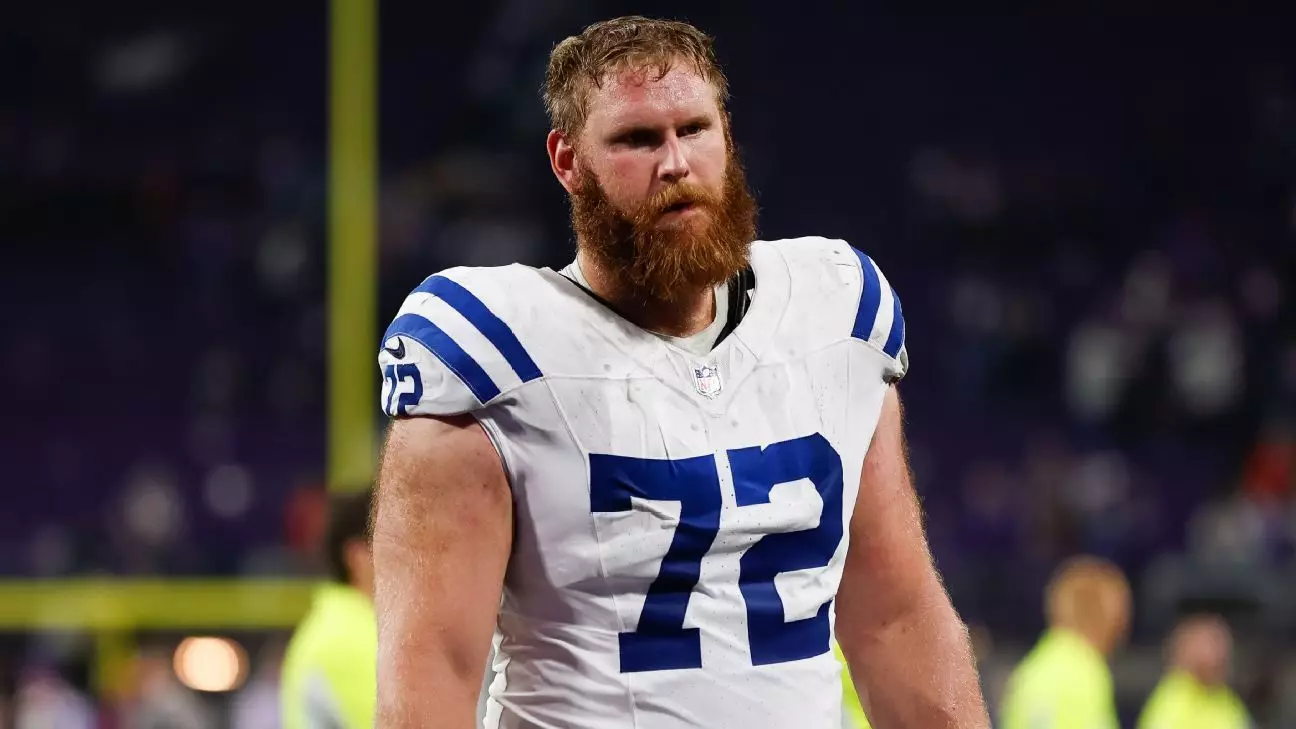In the world of professional sports, mental health remains tragically under-discussed. Players are often hailed for their physical prowess, yet many face daunting psychological hurdles that go unnoticed. Recently, Indiana Colts’ offensive tackle Braden Smith opened up about his intense struggles with obsessive-compulsive disorder (OCD), shedding light on a topic that deserves more attention in the athletic community. His candid revelations emphasize that even the strongest among us contend with invisible battles that can lead to tragic consequences.
Smith’s journey took a harrowing turn that would compel anyone to reevaluate their priorities. Missing the last five games of last season was merely the surface reflection of deeper internal turmoil. As a professional athlete, he was expected to deliver time and again; instead, he found himself considering the unthinkable: suicide. It is a stark reminder that, beyond the physical discipline, athletes face immense emotional pressures that can sometimes culminate in despair. His experience is a clarion call to all—mental health awareness within sports must become a paramount priority.
A Deep Dive into Scrupulosity
What distinguishes Smith’s condition is its specificity. Diagnosed with religious scrupulosity, he wrestled with obsessive thoughts regarding morality and spirituality; his internal litany was one of relentless self-judgment. According to the International OCD Foundation, this condition diverges dramatically from healthy religious practice, as it breeds a cycle of anxiety focused on not offending a higher power. Smith spoke candidly about this relentless quest for perfection, exclaiming, “There was only one person that was ever perfect, and that was Jesus.”
Living under the weight of such overwhelming expectations can be crippling. For Smith, the standard he felt compelled to uphold led to debilitating compulsions that invaded every aspect of his life—personal relationships, professional commitments, and even simple day-to-day activities. It became a dark cloud, shrouding his existence and personal joy. His sincerity in sharing this struggle is a powerful statement, urging the wider public to understand that mental illness can have a devastating ripple effect.
The Path to Healing
Smith’s decision to seek treatment was crucial for his recovery. After initial therapy sessions yielded minimal results, he recognized the necessity of more intensive interventions. His dramatic shift to a treatment facility in Colorado highlighted the lengths he was willing to go to reclaim his life. However, many may question why he sought alternative therapies, such as ibogaine, a psychedelic that remains illegal in the United States. Research into psychedelics has shown potential for mental health treatment, and Smith’s choice underscores the frustration many face within traditional treatment paradigms.
It was during his time in Mexico that Smith experienced what he described as a transformative breakthrough. After integrating this unconventional therapy with ongoing support, he found a renewed sense of self. “I want to be me again,” he passionately expressed, indicating his desire not just to survive, but to thrive. It demonstrates that recovery is not merely about overcoming the negative; it’s about rediscovering oneself and navigating life through a new lens of possibility.
A Return with a Renewed Sense of Purpose
The Colts organization has confidently embraced Smith’s return, citing him as an essential asset for the team. General Manager Chris Ballard’s assertion that “Braden Smith is back and he’s in a great spot” reflects not only a belief in Smith’s athletic capabilities but also a recognition of his personal growth. It points to a larger narrative within the team culture that favors holistic player welfare—acknowledging that well-being off the field translates directly into performance on it.
Financially, Smith restructured his contract, accepting a significant pay cut yet emphasizing his commitment to the Colts. “I have unfinished business in Indianapolis,” he said, an inspiring declaration of intent that reveals his focus on personal connections and growth in this next chapter. This sentiment resonates beyond football; it’s a reminder of the hidden struggles many endure while pursuing their paths—there is strength in vulnerability and power in resilience.
The story of Braden Smith serves as a powerful reminder of the importance of mental wellness in the competitive realm of sports. It affirms that vulnerability can coexist with strength and that the human spirit is capable of extraordinary healing. In a society that often underappreciates mental health, Smith’s journey is a clarion call for empathy, understanding, and action.


Leave a Reply